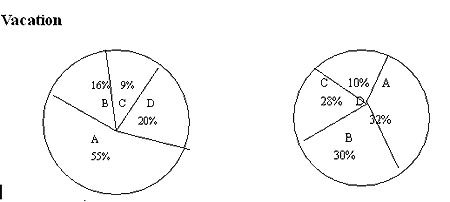1Īóšōšf(shu©Ł)╬─
ĪĪĪĪ└²1Ż║Buying or Borrowing Books?
ĪĪĪĪ(1)ėąą®╚╦šJ(r©©n)×ķĢ°æ¬(y©®ng)įōĮĶüĒ(l©ói)┐┤
ĪĪĪĪ(2)ėąą®╚╦šJ(r©©n)×ķĢ°æ¬(y©®ng)įō┘IüĒ(l©ói)┐┤
ĪĪĪĪ(3)─ŃĄ─▀xō±���Ż┐
ĪĪĪĪBuying or Borrowing Books?
ĪĪĪĪBooks can arm us with knowledge and information we need to make success of life. There are generally two ways in which we can have access to books: borrowing or buying. While millions are borrowing books, I still think buying them best suits me and gives me the greatest pleasure.
ĪĪĪĪMany people choose to borrow books. For one thing, borrowing books can save us huge amounts of money. For another, if we borrow books from the library or friends, we normally have deadline to finish them. And consequently we can read more books in a limited time, just as a famous Chinese saying goes, Ī░books can not be read unless borrowed.Ī▒
ĪĪĪĪI believe that advantages for buying books are more obvious and compelling. Firstly, we can keep the books as long as we wish. Secondly, we can take whatever notes on the margin of the pages of the books. Finally, the process of selecting and keeping books can be a great fun.
ĪĪĪĪ└²2Ż║šōļŖįÆ┼cīæą┼ Will Phones Kill Letter Writing?
ĪĪĪĪ1.įSČÓ╚╦Č╝šJ(r©©n)×ķ╚╦ļŖįÆīó╚Ī┤·īæą┼����Ż¼─ŃšJ(r©©n)×ķ─ž�Ż┐
ĪĪĪĪ2.šł(q©½ng)┴ą┼e─▄ų¦│ų─Ńė^³c(di©Żn)Ą─šōō■(j©┤)
ĪĪĪĪ3.Įoę╗éĆ(g©©)║å(ji©Żn)Č╠Ą─ĮY(ji©”)šō
ĪĪĪĪWill Phones Kill Letter Writing?
ĪĪĪĪToday, more than ever before, we depend on the expediency brought about by such modern devices as phones. As a result, when we feel the need to communicate with friends, instead of picking up the pen to set down to serious writing, we pick up the phone. Indeed, we speak so much and write so little that some people begin to suspect that phones will kill letter writing. However widely used it is today, the phone will not take the place of letter, for both phone and letter writing have respective functions to perform.
ĪĪĪĪThere are at least two reasons, as far as I am concerned, why this will not happen. For one thing, although phones admittedly have already taken over many roles traditionally played by the letter, there are certain areas such as commercial transactions and legal correspondence, in which black and white sincerity and confirmation is still a must. For another, in no way can a quick phone conversation convey and accomplish as much as a deliberate, well worded letter does. For instance, there seems to be no better device than letter writing to express deep, heart-felt, profound love, a fact underlined by the enormous love letters of great men and women.
ĪĪĪĪAs we know, in the 1960Ī»s, there had been so much talk that TV would kill newspapers. And it has never happened. Today we are in a similar situation. We can be certain, for the reasons discussed above, that letter writing is irreplaceable.
ĪĪĪĪ└²3Ż║šō┤ņš█Is Frustration a Bad Thing?
ĪĪĪĪ1.ėąą®╚╦šJ(r©©n)×ķ┤ņš█╩Ūē─╩┬
ĪĪĪĪ2.Ė³ČÓĄ─╚╦▓ó▓╗šJ(r©©n)×ķ┤ņš█╩Ūē─╩┬
ĪĪĪĪ3.╬ęĄ─┐┤Ę©
ĪĪĪĪAccording to The New Oxford Dictionary of English, frustration, by definition, means the feeling of being upset or annoyed, especially because of inability to change or achieve something. Since frustration seems to be a negative feeling, some people may be tempted to think that frustration is bad for people. They believe that constant frustration may cause serious mental problems. People suffering from such psychological problems often resort to violence or suicide, which poses a big threat to the people around them and thus causes instability to the whole society.www.51test.net
ĪĪĪĪOthers, however, hold a different view. They maintain that it is beneficial to people. It goes side by side with success. It inspires people to overcome hardships and difficulties and achieve the final success. People with this view even go so far as to say that no frustration, no success. Indeed, we cannot always hope to embrace success and never accept failure. And most importantly, only if we learn from many a failure can we do things better and finally overcome such a bad feeling as frustration.
ĪĪĪĪFrustration thus is part of our life experience. In our process of growing up, we may inevitably experience it when confronted with situations that donĪ»t come up to our expectations. It is a test of our courage when it befalls us. If we let it control us, we may fall into the abyss of being inflicted by serious psychological problems. But if we harness it and take it as our source of inspiration, we may ultimately enjoy the glory of success.
ĪĪĪĪ2.łD▒ĒŅ}

łD▒ĒŅ}
ĪĪĪĪA. staying at home
ĪĪĪĪB. traveling
ĪĪĪĪC. doing social investigation
ĪĪĪĪD. other ways
2006─Ļ6į┬17╚šėóšZ(y©│)╦─┴∙╝ē(j©¬)įćŅ}┤░Ė░l(f©Ī)▓╝═©ų¬





